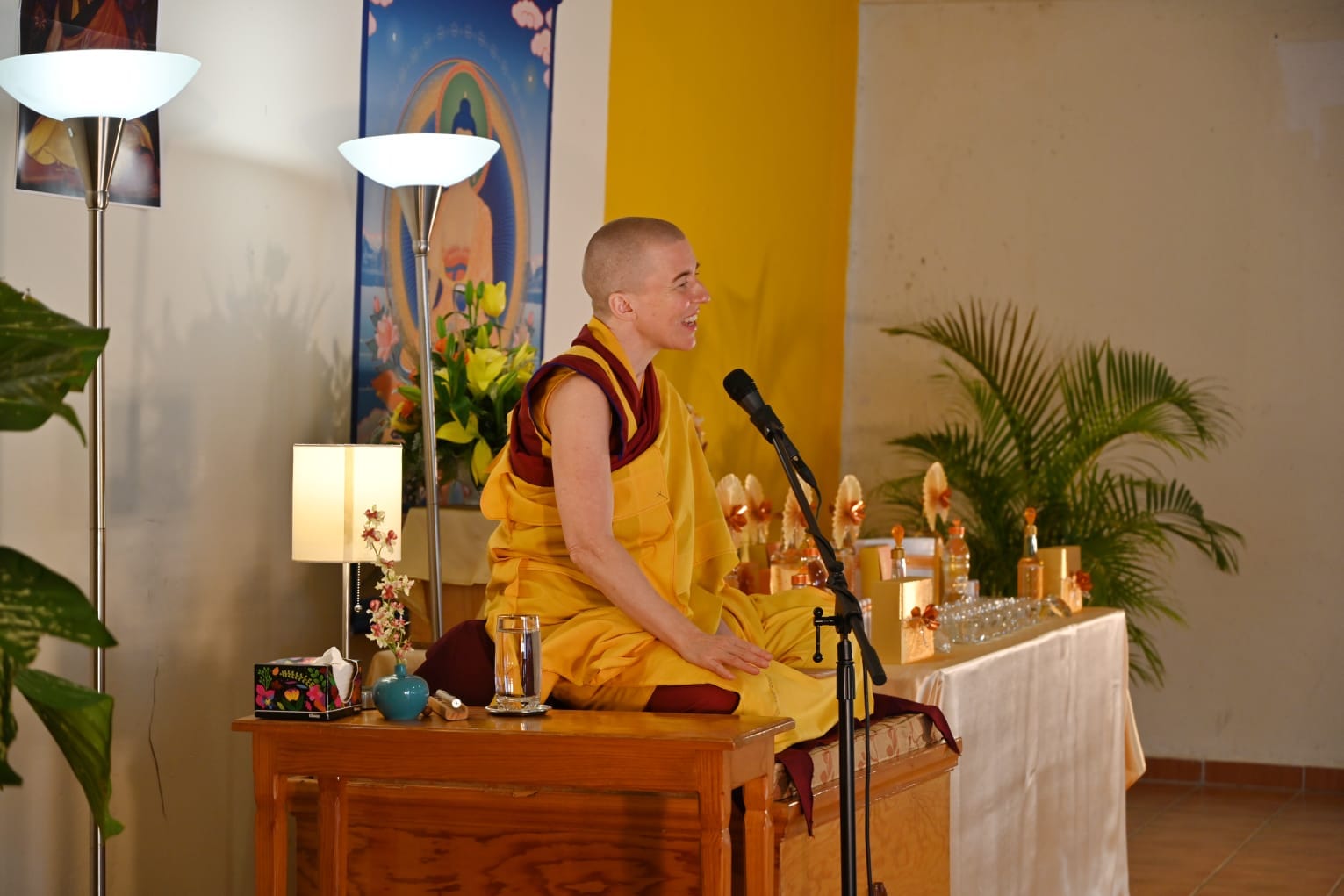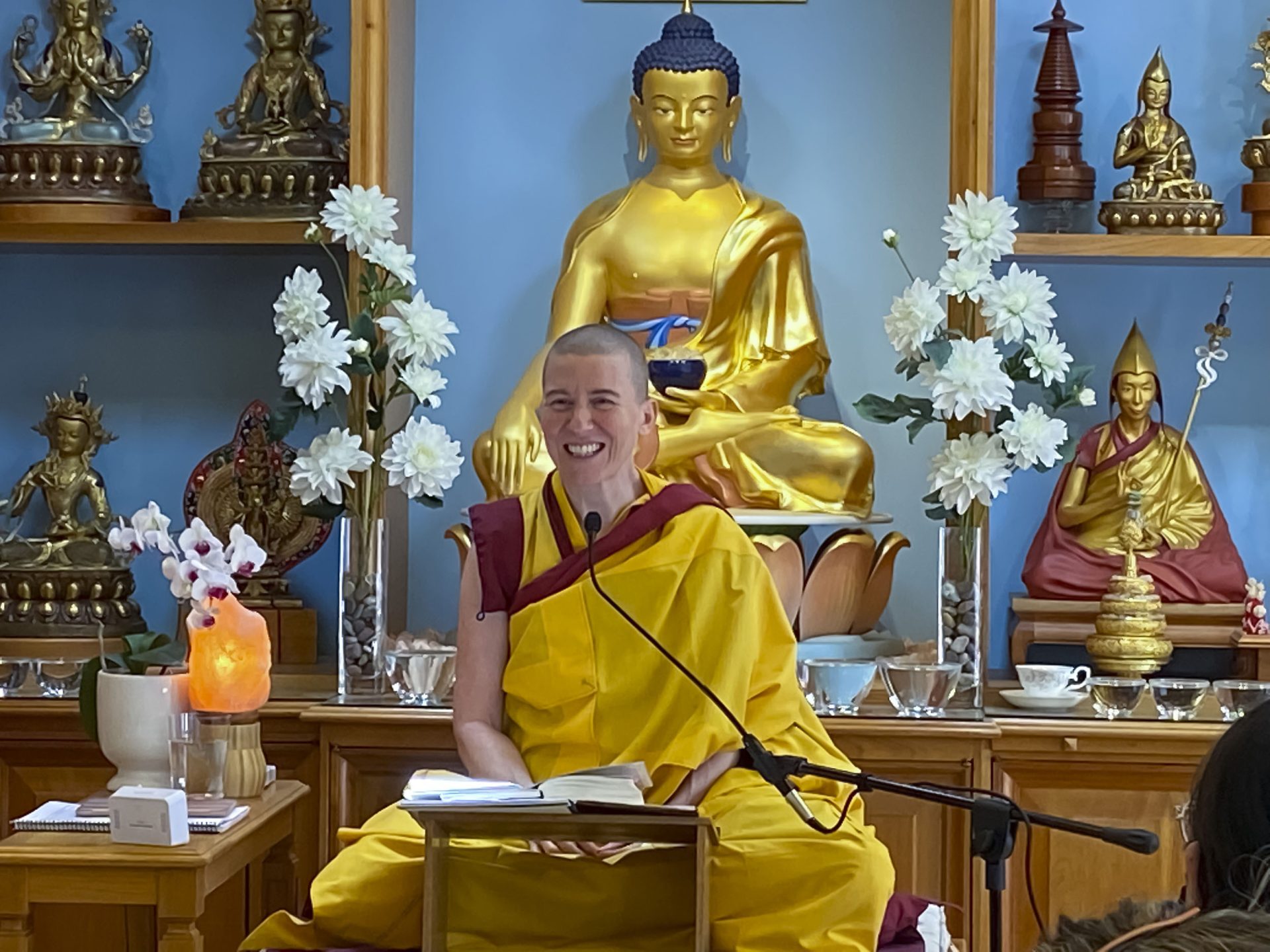PODCAST: Supreme Mother Protector Palden Lhamo, Aspect of Tara
As a child, who did you go to for protection: the parent who let you do anything and smiled while you did it, or the parent who yanked you back from the brink with a stern voice and scowl....

As a child, who did you go to for protection: the parent who let you do anything and smiled while you did it, or the parent who yanked you back from the brink with a stern voice and scowl. When all is right with the world, we go to the smiling parent. When we are in danger, we need our wrathful parent.
In Tibetan Buddhism, Palden Lhamo is that ferocious mother protector. Also known as Shridevi, she is the enraged, dark emanation of Vajra Sarasvati — who is an emanation of Tara. She is like the no-nonsense, stern mother, who can pull you back from danger with awesome motherly strength.
Listen Now!
Transcript
Palden Lhamo is the unrestrainable, bulked-up mother who can lift a car off of a trapped child — the awesome power of a furious mother. You could think of Tara as the “nice mother” supportive and protective, with embracing arms, and Palden Lhamo as the same mother, but super wrathful, enraged, and awesome in Her power; nothing, absolutely nothing, can stand against Her. You can also think of Palden Lhamo as the fierce aspect of wisdom, as the wrathful emanation of Vajra Sarasvati.
According to Venerable Zasep Rinpoche:
“Palden Lhamo, meaning Glorious Goddess, is a fierce Dharma protector of Tibet. She has many names and takes many forms. Palden Lhamo is an emanation of Tara and Sarasvati. On an ultimate level, Palden Lhamo is a fully enlightened being. On a worldly level, in order to subdue and convert rough and difficult beings, she became a wrathful and fearsome goddess. She has different names and different emanations.”
It may seem odd to consider both White Tara, and dark Palden Lhamo as Mothers — emanations of the same being. Yet, mothers can be ferocious when they need to be.
Rob Preece, in The Psychology of Buddhist Tantra, describes her ferocious mother aspect this way:
“She is a ferocious looking crone, a wild and terrible demoness, riding a mule across an ocean of blood… Thus, as in all deities, a dual nature is evident; light and dark, upper world and underworld, peaceful and wrathful. The forces of the Shadow are not inherently demonic and terrible. Light and dark, good and evil, creation and destruction are relative dualities that have no ultimate true nature.”
Against who is her ferocious power directed? Not just against the dangers of our world, but against our own ignorance:
Preece explains:
It is this ignorance and stupidity that … wrathful deities are directed against. No nonsense, no bull— that’s Palden Lhamo. In Her primary function as a Dharma protector, she protects us — from ourselves. In Tibetan Buddhism, Dharma Protectors serve an important function in cutting ignorance, anger, obstacles, and even dangerous situations.
This is symbolically reinforced by Her Ghoulish appearance, horrifying enough to send even the most terrifying demon yelping for cover. “She is almost naked, and her body is wreathed in snakes and adorned with bone ornaments and a necklace of skulls. In her left hand, she bears a brimming skull cup. In her right hand, she holds aloft a black skull-topped staff… Flames roar and black storm clouds swirl around her…”
How important is Palden Lhamo Practice?
How important is Palden Lhamo practice in Tibetan Buddhism? Venerable Losang Samtem explains:
“There are so many Buddhas and Bodhisattvas who are constantly willing to help all living beings overcome suffering… The most important and powerful protector deity in Buddhist history is Panden Lhamo. Even though these Enlightened beings, including Panden Lhamo, are always willing to help, it is necessary for us to cultivate the potential within ourselves. We need to be open to receive the blessings of these deities.”
Palden Lhamo and You: a Lion and Her Cub
How ferocious is Palden Lhamo’s protection? Think of a wrathful lioness mother, protecting her cubs — now multiply that wrathful protection infinitely. Palden Lhamo’s wrath and power is on your side. You are her cub.
According to teacher and author Vessantara:
“Not only can Shridevi control dark external forces; She is capable of pacifying all those hindering inner forces that bind us to the ‘wheel of fire’ of mundane existence. Hence she is also known in Tibet as the one who overpowers and crushes the hosts of the passions — Paldan Makzor Gyalmo.
Palden Lhamo’s origin story and Hayagriva
What is her origin story? As can be expected of a wrathful protector, her story is gruesome, and brimming with symbolism. Ultimately, Palden Lhamo took a vow as the incomparable Dharma Protectress from Hayagriva. Prior to that she was a goddess and helped various Buddhas. Yet earlier than that, there is a terrible origin legen, which gave rise to many of her symbols, including that of the mule she rides in her most common images. As quoted from Venerable Zasep Rinpoche in his book Source of All Protectors:
There is a frightful Tibetan legend of Palden Lhamo. She was married to evil Yama, the King of Lanka. He had a nasty character and was known to have caused widespread slaughter among his subjects. One of his main wishes was to expel Buddhism from his kingdom. He became a foe of the Dharma.
Palden Lhamo, his wife, vowed to convert him into a supporter of Buddhism to make him a gentler and kinder king, and to establish virtuous communities. She worked tirelessly to change the ways of her bloodthirsty husband.
Palden Lhamo realized her son was even worse than his father. He had developed so much hate and was a destroyer of Buddhism. She thought that if her son did destroy Buddhism he would create so much unwholesome karma and he would take a hellish rebirth.
Continuing this gruesome story, while the evil cannibal king was away on a hunting trip, she murdered her son to prevent his cannibalism — knowing she herself would be destined to go to the hell realms. She skinned him and used his skin as a saddle blanket. When the king returned to his palace and found out what his wife had done, he raged and screamed and shot arrows at her as she fled the city. He missed her and struck her mule instead — which gave rise to a wisdom eye on her mule’s hindquarters — an important part of her future iconography. As a result of her deeds, she was born into the hell realms herself. When she was finally released from the hell realms, she stole a bag of diseases from the hell guards — to prevent these malicious diseases from being unleashed in our world.
Later, Lord Buddha appeared to her and told her to take an oath to become a Dharma protector. She was shocked, but also moved by Buddha’s faith in her. She took the oath and became a sworn Dharma protector, now riding her mule with a wisdom eye on his hindquarters, her bag of diseases and bag of Dice, symbolizing her ability to see the future. In other stories, she gave her heartfelt service to Hayagriva and also to Vajrapani. Various gods offered her gifts. As always, these gruesome stories serve to illustrate symbolic concepts.
Ferocious Appearance of Palden Lhamo
It can take some effort to unpack the extensive symbolism of Palden Lhamo. Every element of her iconography has profound significance. Her appearance, at first, does not seem to inspire devotion or love from her followers. Snakes for horse reins, and a bag of diseases. A human skin for a saddle — and no less than her own son. A demonic, wrathful face, black and ferocious.
In her tea offering praise, she is described this way:
“Fierce maker, Fierce Being, Her reality is ferocious
Chief Lady of the retinue of the fierce,
Her symbolic body a glistening dark black!
I bow to the all-terrifying Mother Goddess!
I Fiercely pray, make me free of diseases, demons, foes and obstructions!”
Thinking of Her cannibal-demon face — with the garland of fifty blood-dripping decapitated heads hanging around Her neck — love is probably the last thing that jumps to mind. Your hands probably shake as you make a tea offering to this ferocious persona. Yet, like the stern parent, with wildly glaring eyes, she’s there to keep you on track, to keep you practicing, to keep you focused on Enlightenment.
Her snarling ghoulish face — in some ways more memorable and easily visualized than the lovely face of Her lighter emanation White Tara — is there to caution you: do your practice, get to work, help all beings, bring compassion to the world. Stop wasting time with video games!
Symbolism of Palden Lhamo
Every detail of Palden Lhamo’s appearance and accoutrements is symbolic on three levels: outer, inner, and secret. The outer level is related in her history as the woman warrior who fought the demon king of Lanka. The inner level consists of symbolic meanings related to the path to liberation. On the secret level, taught only to initiates, every detail becomes significant as an element in the mystical practice of internal Tantric yoga.
Robert Warren Clark in The Arts of India, South East Asia, and the Himalayas, describes the symbolism of Palden Lhamo this way:
Palden Lhamo has one face and two arms. On the inner level of symbolism, she holds in her mouth the demon of mental afflictions. She bites down on this demon with her sharp fangs of mindfulness, circumspection, heedfulness, and diligence. Her red hair rising upward represents the blazing fire of perfect wisdom (jnana) that incinerates all worldly conceptions (vikalpa), which are the underlying causes of all misery. She wears the five-skull crown showing that she has extinguished the five poisons (greed, anger, ignorance, pride, and jealousy). The third eye of wisdom is wide open in the middle of her forehead. The Tantric symbol of the sun of wisdom marks her navel, and the moon of compassion marks her crown. The peacock-feather parasol of ultimate attainment rises above her head. A long necklace of fifty severed heads is strung on a wire representing intestines. The fifty heads correspond to the fifty worldly states of mind that must be cut off.
Two Famous Attendants: Lion-Faced Dakini and Makara-Faced Dakini
Palden Lhamo’s retinue is “so large that the description of it would fill a whole iconographical book.” It includes four Queens of the Seasons, five Goddesses of Long Life, and a retinue of female protectresses known as Mahakali.
Palden Lhamo has hundreds in her vast entourage, but her most famous attendants are Lion-Faced Dakini Simhavaktra and Dragon-faced or Makara-faced Dakini Makaravaktra. Lion-Faced Dakini, especially, is a wrathful protector practice popular in Tibetan Buddhism. These two are dakinis who protect followers of Buddha from dangers. Makaravaktra protects against dangers from the underworld and Simhavaktra against dangers of the upper world.
Bringing Palden Lhamo’s Blessings
The best way to connect with the Glorious Goddess Palden Lhamo is to start with a regular tea offering, praise and prayer. As you do this, do not visualize yourself as the Goddess. Visualize yourself as your own Yidam meditational deity. Palden Lhamo appears in front of you.
The following short tea offering to the Glorious Goddess Palden Lhamo, does not require initiation. The full Sadhana, of course, DOES require initiation. If you do have Empowerment or permission, it is, of course, best to do the full tea ceremony per your tradition.
Tea Offering.
Prepare very strong tea, and put out a cup, usually on a deep plate or bowl. More formally, you can use a Serkyem, as shown in our demonstration. In the bowl you add some grains. Fill the cup or bowl with tea. Recite the praise, and with the last line in each verse, pour a little more tea so that it overflows (symbolizing abundance.). If that is too difficult, simply pour out the tea, then recite the verses. Make sure to “take refuge in the Three Jewels first” and “Dedicate the Merit” at the end.
Refuge and Bodhichitta
I go for refuge until I am enlightened
To the Buddha, the Dharma, and the Supreme Assembly.
By my merit from giving and other perfections,
May I become a Buddha in order to benefit all sentient beings. (3x)
Bless the Tea
Before you pour, bless the tea symbolically by saying the mantra representing the body, speech and mind of the Buddhas: Om Ah Hum. Om Ah Hum. Om Ah Hum.
Now, pour the tea as you chant, imagining the hot tea represents your active offering to Palden Lhamo, her entire entourage, and all the Enlightened Buddhas, Bodhisattvas and Protectors. In the verses, “doctrine of the guide” refers to the Buddha’s Dharma.
We use hot tea to symbolize activity, since we are imagining we are encouraging the Enlightened helping activity of the entourage. “Skilled in Siddhi powers” means she has the power to help us. “Ruler of the desire realm” refers to our world. The phrase “entrusted actions” refers to the activities of a sword Dharma protector to help sentient beings.
Vsiaulize that they receive the blessings and are pleased with you. Chant along with us now. The second and third verses are repeated three times.
Prayer and Requests
O gurus and yidams who send a rain of all that is desired,
Mistress of the desire realm and host of Dharma protectors and guardians,
Please accept this libation having the five desirable qualities
And bestow the activities that will accomplish all desired aims.
Supreme Dharma protector guarding the doctrine of the guide,
Who protects yogis as she would her child and is skilled in siddhi powers:
To the ruler of the desire realm, the glorious goddess Pälden Lhamo,
I request and make offerings; please perform the entrusted actions. (3x) (Pour tea.)
Though not disturbed from the state of ultimate peace,
You arose in a fierce form to subdue enemies of the doctrine.
To the sole mother, queen of the three existences,
I request and make offerings; please perform the entrusted actions. (3x) (Pour tea.)
Dedication of Merit. [pause x-strong]
By this virtue, may I quickly
Attain the state of a Guru-Buddha
And lead every living being, without exception,
Into that enlightened state.
May the precious bohdhi cheettah
Not yet born arise and grow.
May that born have no decline
But increase more and more.
Dedication of Merit. [pause x-strong]
By this virtue, may I quickly
Attain the state of a Guru-Buddha
And lead every living being, without exception,
Into that enlightened state.
May the precious bodhichitta
Not yet born arise and grow.
May that born have no decline
But increase more and more.

 Hollif
Hollif 
































